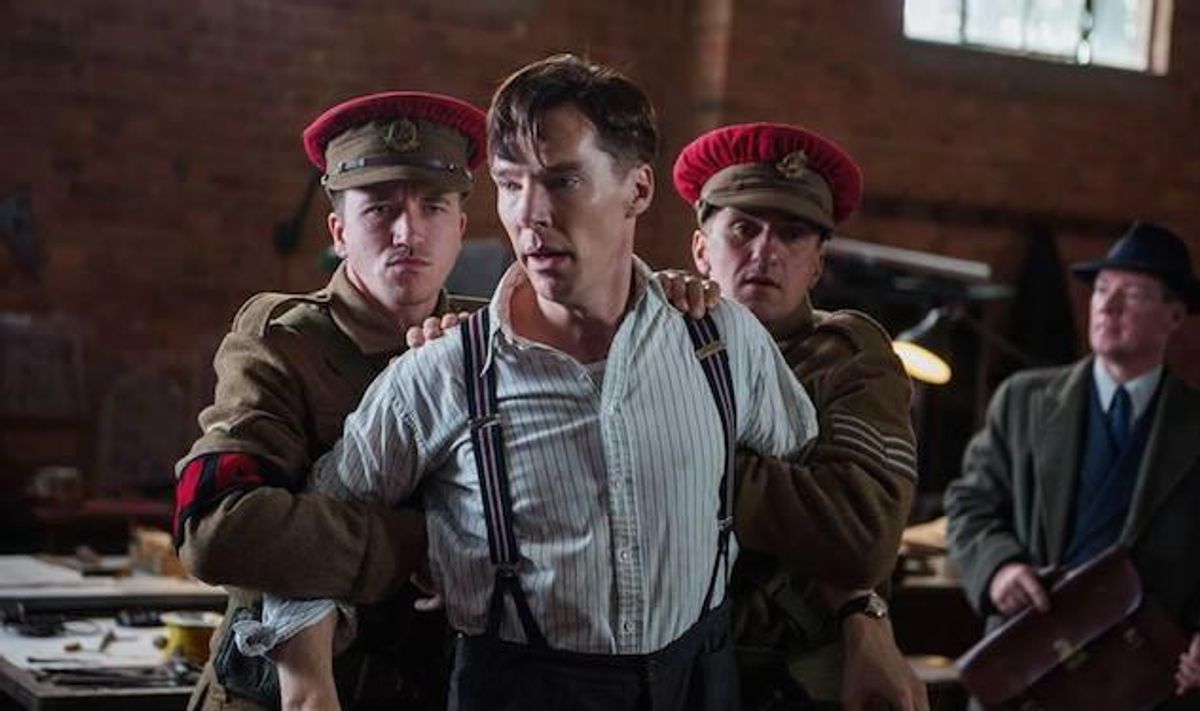
Two approaches to the gay martyrdom and heroism in The Imitation Game and The Circle.
November 26 2014 11:05 AM EST
May 26 2023 1:05 PM EST
By continuing to use our site, you agree to our Private Policy and Terms of Use.

"We're not at war with the Nazis, we're at war with the clock" says Alan Turing in The Imitation Game. Britain's Turing (Benedict Cumberbatch) is the focus of The Imitation Game for two reasons: Mathematician Turing broke the Nazi's Enigma Code during World War II and after his persecution as a gay man living under repressive English law, committed suicide in 1954. His race against the clock has a second meaning: as in Turing's too-early, ahead of his time, misunderstood life.
But Pet Shop Boys told the story better in their oratorio A Man From the Future, a celebration of Turing's life in struggle (including a passage where the word "Sorry," sung in moving repetition, expresses the Queen, the Prime Minister, and the Nation's regret). The Pets' live presentation earlier this year moved ahead to an understanding of Turing's political significance and human value. The Imitation Game's problem is that its best intentions lack the personal resonance of the Pets' musical composition and performance. The film is a too-conventional thus predictable biopic that takes for granted modern attitudes about misunderstood gay genius and courage.
This is not a problem with The Circle (Der Kreis), another history of gay genius and courage, but ingeniously conceived to link the desperate past with modern thinking. Director Stefan Haupt tells the real-life story of Robi Rapp and Ernst Ostertag. Switzerland's first same-sex married couple, who met in the 1930s among a groundbreaking group of gay men who started a magazine and social club both called The Circle. ("Cultivating friendship in love and in freedom," was The Circle's motto.) Forerunners of gay culture and entrepreneurship, The Circle was the setting for drag artist Robi and schoolteacher Ernst's personal development as individuals, a couple, and as witnesses through periods of repression and protest.
A party scene from the film 'The Circle'
Unlike The Imitation Game's wartime and post-war flashbacks, Haupt mixes past and present using both documentary and dramatic styles (Sven Shelker and Matthais Hungerbuhler give emotive performances as the young Robi and Ernst). This method blends together a sense of history and a sense of purpose.
The Circle attains richness and authenticity that mainstream gay movies like The Imitation Game and Brokeback Mountain rarely do. The doc/drama, now/then contrasts achieve an impressive "history of the future"--to quote Erasure's 1987 hit song "Drama." Though set in the past, all sinister aspects of repressed gay living--born of fear--are absent except for the social persecution. Haupt makes the past new so that it is contemporary in feeling; he reconstructs the evolving eras, the attitudes and customs for the generation of filmgoers unfamiliar with it (or with Victor Victoria, Cabaret, La Cage aux Folles, or Taxi Zum Klo). History not just learned from, but felt.
The Imitation Game casts tall, blue-eyed, high-cheekbone Benedict Cumberbatch as Turing to confer a kind of physical heroism on Turing's martyrdom. But this is less successful than Haupt's depiction of heroic sexually--seduction scenes such as hairdresser Robi shampooing Ernst, or men unbuttoning their shirts like opening gift wrap, or exposing their hearts. Tension between Robi and Ernst's ideas of sexuality and eroticism, relationships vs. promiscuity, are way beyond anything The Imitation Game dares attempt.
Commemorating Alan Turing is well and good but a bit self-congratulatory. The Circle has uncanny immediacy, like the best pop music that carries forward the legacy of gay struggle in ways as sophisticated as Pet Shop Boys and as emotionally powerful as Erasure. Even as a senior drag actor, Robi (called "an enchanting boy" during his child film star years) maintains this struggle and triumph. He ends the film performing Ernst's confessional poem: "I'm so strange/ Oh I'm so strange/ I can't even tell if I'm still alive/ Or if I am just a dream/ I almost think I am a teddy bear." Turing, Robi, and Ernst's contemporary, would have understood.
The Imitation Game opens in theaters Nov. 28. The Circle is currently playing in select theaters.
Sexy MAGA: Viral post saying Republicans 'have two daddies now' gets a rise from the right